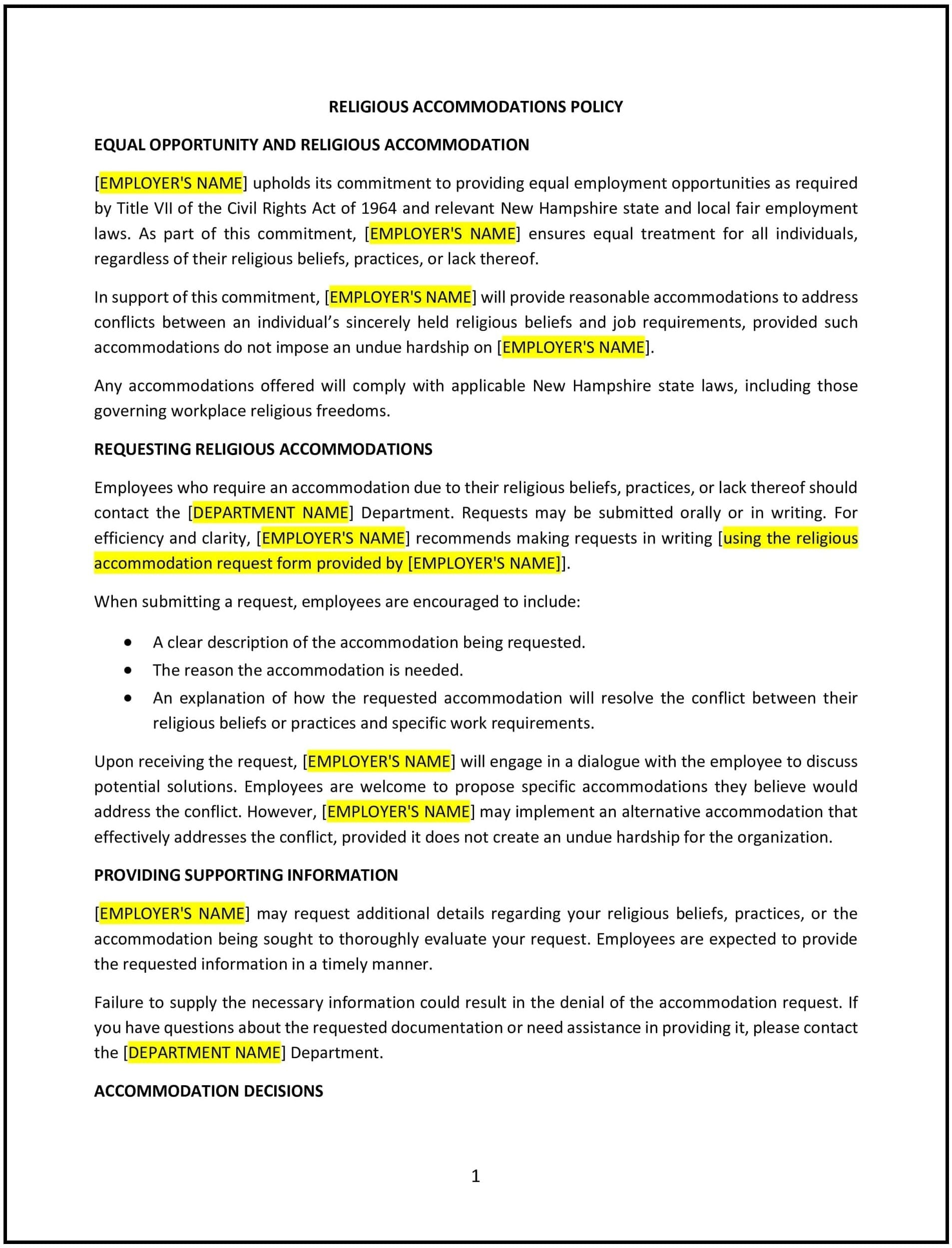Religious accommodations policy (New Hampshire): Free template
Got contracts to review? While you're here for policies, let Cobrief make contract review effortless—start your free review now.

Customize this template for free
Religious accommodations policy (New Hampshire)
A religious accommodations policy helps New Hampshire businesses create an inclusive workplace by outlining procedures for addressing employees’ requests for religious accommodations. This policy covers time off for religious observances, dress code modifications, and any other requests related to religious beliefs or practices.
By implementing this policy, businesses can foster an inclusive environment, ensure fair treatment of employees, and comply with legal requirements regarding religious accommodations.
How to use this religious accommodations policy (New Hampshire)
- Define religious accommodation needs: Specify the types of accommodations that may be requested, including flexible scheduling for religious observances, modifications to dress code policies, and time off for religious holidays.
- Establish a request process: Outline how employees should request religious accommodations, including advance notice requirements, the type of information they may need to provide, and the timeline for submitting requests.
- Assess each request individually: Ensure that each request for religious accommodation is considered on a case-by-case basis. Consider the employee’s needs and how the accommodation might affect the workplace, while maintaining flexibility in approach.
- Determine reasonable accommodations: Define what constitutes a "reasonable" accommodation, considering factors such as operational requirements, employee safety, and the potential impact on coworkers and business operations.
- Address undue hardship: Clarify the conditions under which a requested accommodation may be denied due to undue hardship on the business. Undue hardship might include significant financial costs, operational disruptions, or safety concerns.
- Maintain confidentiality: Ensure that all religious accommodation requests and related discussions are kept confidential, shared only with relevant personnel on a need-to-know basis.
- Review and update: Regularly review and update the policy to ensure that it reflects current legal standards, company practices, and any changes in the employee population.
Benefits of using this religious accommodations policy (New Hampshire)
This policy provides several benefits for New Hampshire businesses:
- Promotes inclusivity: By accommodating employees' religious practices, businesses demonstrate their commitment to diversity and inclusion, fostering a respectful work environment.
- Reduces legal risks: A clear and fair policy helps businesses comply with state and federal laws regarding religious accommodations, minimizing the risk of discrimination claims.
- Enhances employee satisfaction: Providing reasonable accommodations for religious beliefs helps employees feel valued and supported, improving job satisfaction and retention.
- Increases productivity: When employees’ religious needs are met, they can focus better on their work, reducing absenteeism and improving overall productivity.
- Strengthens company reputation: Businesses that are seen as supportive of religious diversity enhance their public image and attract a diverse workforce.
Tips for using this religious accommodations policy (New Hampshire)
- Communicate the policy clearly: Ensure that all employees are aware of the religious accommodations policy and understand the procedure for requesting accommodations.
- Be flexible and open: When reviewing requests, approach each case with flexibility and an open mind, recognizing the importance of religious practices for many employees.
- Maintain clear documentation: Keep records of all requests for religious accommodations and the decisions made, ensuring that employees’ rights are respected and that business needs are balanced.
- Handle requests promptly: Respond to requests for religious accommodations in a timely manner, ensuring employees have enough time to plan for any required accommodations, such as time off.
- Foster a supportive culture: Encourage an open and supportive workplace culture where employees feel comfortable discussing their religious needs and accommodations.